
Freshwater Threats
Freshwater habitats face a multitude of threats, but it's not too late to save these environments.
Freshwater ecosystems are essential for human survival, providing the majority of people's drinking water. The ecosystems are home to more than 40 percent of the world's fish species. Despite their value and importance, many lakes, rivers, and wetlands around the world are being severely damaged by human activities and are declining at a much faster rate than terrestrial ecosystems.
More than 20 percent of the 10,000 known freshwater fish species have become extinct or imperiled in recent decades. Watersheds, which catch precipitation and channel it to streams and lakes, are highly vulnerable to pollution. Programs to protect freshwater habitats include planning, stewardship, education, and regulation.
Threats
- The creation of dams and water-diversion systems blocks migration routes for fish and disrupts habitats.
- Water withdrawal for human use shrinks and degrades habitats.
- Runoff from agricultural and urban areas hurts water quality.
- Draining of wetlands for development depletes habitats.
- Overexploitation and pollution threaten groundwater supplies.
- Invasion of exotic species can harm native animals and plants.
- Global warming may lead to devastating floods and droughts.
Solutions
- Restrict the construction of dams.
- Provide incentives for farming business to reduce the use of pesticides.
- Establish protected wetlands areas.
- Regulate water withdrawal for human use.
You May Also Like
Go Further
Animals
- How can we protect grizzlies from their biggest threat—trains?How can we protect grizzlies from their biggest threat—trains?
- This ‘saber-toothed’ salmon wasn’t quite what we thoughtThis ‘saber-toothed’ salmon wasn’t quite what we thought
- Why this rhino-zebra friendship makes perfect senseWhy this rhino-zebra friendship makes perfect sense
- When did bioluminescence evolve? It’s older than we thought.When did bioluminescence evolve? It’s older than we thought.
- Soy, skim … spider. Are any of these technically milk?Soy, skim … spider. Are any of these technically milk?
Environment
- Are the Great Lakes the key to solving America’s emissions conundrum?Are the Great Lakes the key to solving America’s emissions conundrum?
- The world’s historic sites face climate change. Can Petra lead the way?The world’s historic sites face climate change. Can Petra lead the way?
- This pristine piece of the Amazon shows nature’s resilienceThis pristine piece of the Amazon shows nature’s resilience
- Listen to 30 years of climate change transformed into haunting musicListen to 30 years of climate change transformed into haunting music
History & Culture
- Meet the original members of the tortured poets departmentMeet the original members of the tortured poets department
- Séances at the White House? Why these first ladies turned to the occultSéances at the White House? Why these first ladies turned to the occult
- Gambling is everywhere now. When is that a problem?Gambling is everywhere now. When is that a problem?
- Beauty is pain—at least it was in 17th-century SpainBeauty is pain—at least it was in 17th-century Spain
Science
- Here's how astronomers found one of the rarest phenomenons in spaceHere's how astronomers found one of the rarest phenomenons in space
- Not an extrovert or introvert? There’s a word for that.Not an extrovert or introvert? There’s a word for that.
- NASA has a plan to clean up space junk—but is going green enough?NASA has a plan to clean up space junk—but is going green enough?
- Soy, skim … spider. Are any of these technically milk?Soy, skim … spider. Are any of these technically milk?
Travel
- Dina Macki on Omani cuisine and Zanzibari flavoursDina Macki on Omani cuisine and Zanzibari flavours
- How to see Mexico's Baja California beyond the beachesHow to see Mexico's Baja California beyond the beaches
- Could Mexico's Chepe Express be the ultimate slow rail adventure?Could Mexico's Chepe Express be the ultimate slow rail adventure?




